PRSA VP of Education Jeneen Garcia, with the Society 25 years, was among those at the initial event of Black PR History Month Feb. 9 at Edelman’s offices. Oddly, we had never met or talked to her.
|
|
Garcia is also executive director of the Society’s PR Student Society of America. She is listened to by its 11,000 members.
We have never talked to her because she has been kept under wraps by the Society’s boycott against the O’Dwyer Co. We have plenty of educational materials for the students including the 800-volume O'Dwyer PR library, PR’s biggest physical library; 48 years of newsletters devoted to PR; 30 years of a monthly magazine, and 16 years of website stories, databases and commentaries.
|
|
Emails to student leaders are never answered.
It was beyond ironic that the opening session of Black PR History Month, sponsored by the Museum of PR, should take place at Edelman since founder Dan Edelman was a staunch opponent of the PRSA boycott against the O’Dwyer Co. He advised this reporter many times to fight it.
It has been instituted since 1999 by the “accredited” members who have controlled the board since the late 1970s, holding 16 of the 17 seats in 2017. Attempts were made by members in 1999, 2006 and 2010 to oust the APRs but they failed. Richard Edelman was a leader of the 2010 foray.
Dan Edelman Denounced Boycott
Dan Edelman in 1999 denounced PRSA when the board headed by Sam Waltz declared a formal boycott against the O’Dwyer Co., saying our reporters were taking up too much staff time. Waltz publicized the boycott in PR Week. The Waltz board did not want to discuss the $150,000 PRSA Foundation/Rockefeller Foundation study of credible sources of information that found “PR spokesperson” to rank 43rd on list of 45. No PRSA publication ever carried the list.
Dan issued a lengthy statement that ran in the Sept. 29, 1999 O’Dwyer NL. He noted he was the 1999 recipient of the Gold Anvil of PRSA and asked the Society to rescind its O’Dwyer boycott.
|
|
He wrote COO Ray Gaulke that, “It’s contrary to appropriate PR practice to withhold information from a reporter.” The Clinton White House, he said, “had difficult relations with the press during the impeachment process but no reporter was ever barred.” Dan urged Gaulke to meet with O’Dwyer reporters. No such meeting ever took place.
Gaulke, apparently carrying out the wishes of the APR-dominated board, was blatantly anti-O’Dwyer. At his first Assembly meeting in 1994, he came down from stage to the New York delegation where this reporter was sitting (a practice of mine for 20 years), took me by the elbow, and marched me to the back of the room while the entire Assembly watched.
I was never again to set foot in the Assembly, he said. Delegates sat in silence during this atrocity as did the New York delegation.
The staff had shown who is the boss—the staff and not the Assembly or the members. Pat Jackson had ousted virtually all PR pros from the staff starting in 1980, saying the staff should be association professionals. Failure of PR people run their own house is a bad advertisement for PR. No wonder a lot of talented blacks and others are not attracted to the field.
Boycott Briefly Lifted by Pisinski
Steve Pisiniski, 2000 PRSA president, rescinded the O’Dwyer boycott in early 2000. He let us sit in the first row of the Assembly. Steve and his Strategic Planning Committee in 1999 unanimously urged removal of anything related to APR from the bylaws. The Waltz board rejected the proposal.
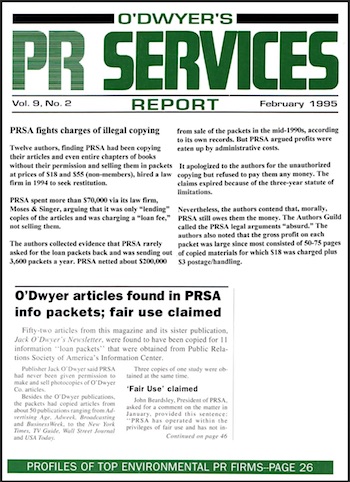 |
However, something far worse than the boycott started taking place with the arrival of Bill Murray as head of staff in 2007. All-out attacks on this reporter became the norm, many of them carried out by VP-PR Arthur Yann. Currently, no one attached to PRSA, from the board to the sections, the chapters and the Student Society, will have anything to do with me as though I had done something wrong to the Society. In fact, the Society had wronged the O’Dwyer Co. by selling tens of thousands of copies of O’Dwyer articles without our permission.
We addressed the 150 at the Feb. 9 event quoting Fraser Seitel’s column of that day saying that the Trump Administration is dashing many of the chief principles of PR. It’s titled “Donald Trump and the End of PR.”
PR Execs, Reporters Are Stressed
PR executive is No. 8 on Careercast’s 2017 list of the ten most stressful jobs. No. 6 is newspaper reporter. Both cause each other a lot of stress.
PR executives are “the face” of public entities such as business, government, institutions, non-profits, celebrities and athletes, says Careercast which has for many years put PR jobs in its “top ten” stress list.
The services of PR people are most needed “at times of crisis,” says Careercast. They have to do “damage control.” A problem for PR people is that they don’t have ultimate control of what is said or communicated, says Careercast.
PRSA’s Truncale Not at Meeting
Conspicuous by his absence at the Feb. 9 meeting was Joe Truncale, CEO of PRSA. All the other heads of major PR groups were there—Renee Wilson of PR Council, Roger Bolton of Arthur Page, Tina McCorkindale of Institute for PR, Patrick Ford of The Plank Center and Neil Foote, National Black PR Society. Truncale told others he was ”out of town.”
We are saddened by the current inaction of the Edelman firm in the face of this boycott.
The O’Dwyer Co. cannot roll over and play dead. We are compiling a list of the worst things PRSA is doing and has done. This is not a private war. Efforts were made in 1999, 2006 and 2010 to bust the monopoly of the APRs. We hope to get such a movement started again. Richard Edelman was one of the leaders of the 2010 “Committee for a Democratic PRSA.”
Actions and policies of PRSA include:
 |
--Moving h.q. three times far from the midtown ad/PR media community with no input or advance notice to members. NY members are afraid to even to ask for details. No details of the new lease at 120 Wall St. are available at the present time.
--Cancelling the printed members’ directory after the 2005 edition with no input from members, thus blocking press access to members after decades of supplying that. Free copies had been given to the press in the early 2000’s.
--Declaring a formal boycott of the O’Dwyer Co. in 1999 after a $150K PRSA Foundation and Rockefeller Foundation study show “PR spokesperson” to rank 43 in credibility among 45 sources of information. Sam Waltz announced the boycott in PR Week.
--Invalidating the enforceable Ethics Code in 1999 after a member charged the board’s boycott of O’Dwyer violated five Code provisions. A new code with no enforcement provisions was created in 2001 at a cost of about $200K. The professions of law, medicine and accounting all have enforceable codes.
--Refusing in 1977 to obey an FTC order that two anti-competitive articles be removed from the Code. The result was a formal FTC consent decree PRSA had to sign and publicize, embarrassing the industry. The board had passed the FTC demand to the Assembly which rejected it.
--Battling attempts by members in 1999, 2006 and 2010 to break the monopoly that APRs have on governance even though they are only 18% of membership. Sixteen of the 17 board members in 2017 are APR when the proportion should be 3 or 4 at the most. The 2010 Committee for a Democratic PRSA, led by Richard Edelman and others, was not allowed to use the member email list to press its case.
--Taking active part in the $21 million lawsuit of TJFR Publishing Co. vs. Jack O’Dwyer and the O’Dwyer Co. charging this reporter with false and malicious reporting of Dean Rotbart’s speech. It was recorded by two videotapes for the PRSA library but then PRSA refused to sell it to anyone or make it available to me. PRSA had unlimited, perpetual rights to it. I was a credentialed reporter at the speech. NYT falsely said I “slipped in” to the speech. NYT did not cover my victory which was first page news in the NY Law Journal.

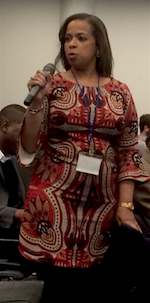 Jeneen Garcia
Jeneen Garcia (L to R) IPR head Tina McCorkindale checks out O'Dwyer's PR library with associate publisher Jane Landers.
(L to R) IPR head Tina McCorkindale checks out O'Dwyer's PR library with associate publisher Jane Landers.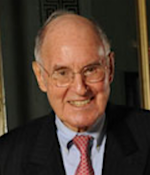 Dan Edelman
Dan Edelman
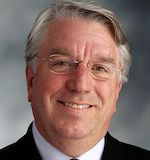 Louis Capozzi, former chair of the MSL Group and former CCO of Aetna, is the 2018 Paladin Award Honoree.
Louis Capozzi, former chair of the MSL Group and former CCO of Aetna, is the 2018 Paladin Award Honoree.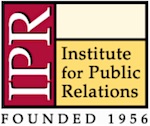 The Institute for PR, which says there is “science” beneath the art of PR, is wallowing in the mud of PRSA and CenturyLink in co-publishing a revived “PR Journal."
The Institute for PR, which says there is “science” beneath the art of PR, is wallowing in the mud of PRSA and CenturyLink in co-publishing a revived “PR Journal." Charges that CenturyLink engaged in fraudulent billing practices have been compared to similar charges against Wells Fargo that cost it $185 millions in fines and resulted in 5,000+ staffers being fired. (1 reader comment)
Charges that CenturyLink engaged in fraudulent billing practices have been compared to similar charges against Wells Fargo that cost it $185 millions in fines and resulted in 5,000+ staffers being fired. (1 reader comment) PR executive is No. 8 on Careercast’s 2017 list of the ten most stressful jobs. No. 6 is newspaper reporter. Both cause each other a lot of stress. (1 reader comment)
PR executive is No. 8 on Careercast’s 2017 list of the ten most stressful jobs. No. 6 is newspaper reporter. Both cause each other a lot of stress. (1 reader comment)


 Have a comment? Send it to
Have a comment? Send it to 
No comments have been submitted for this story yet.